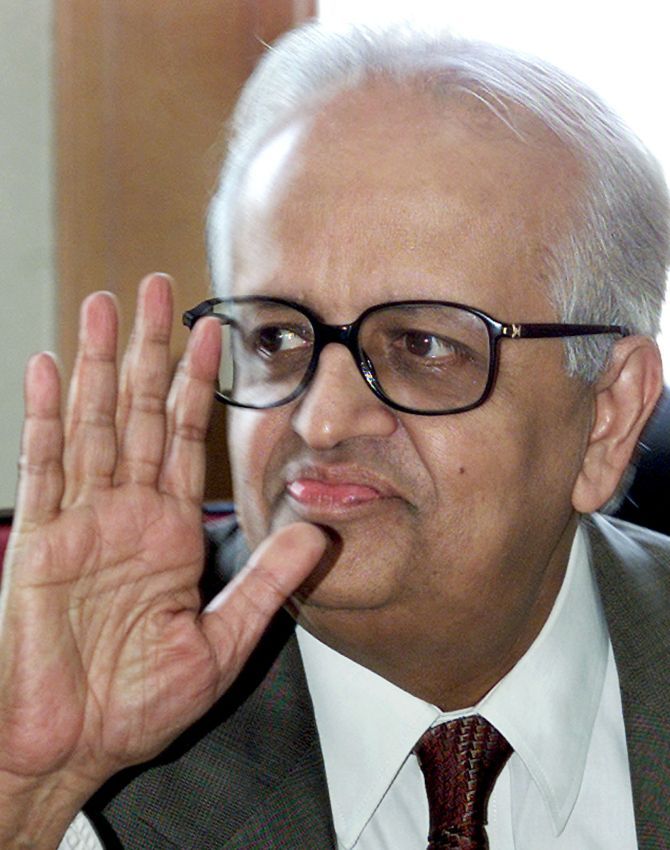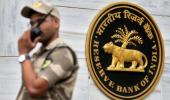'One of the reasons Jalan, the only bureaucrat in India who has been executive director at both the IMF and then the World Bank, successively, can afford to be forthright is that he has seen it all in his 78 years,' says Subhomoy Bhattacharjee.

In 2007, Bimal Jalan had written a commentary of what he saw in Parliament.
It was a period of bitter divisions in both Houses and the former Reserve Bank governor bluntly expressed his shock as the Rajya Sabha, in the midst of utter pandemonium, pass in a jiffy hundreds of “papers including annual reports of public sector organisations, outcome and performance budgets, action-taken reports, and notifications issued by various departments by a dozen ministers”.
These comments on this dereliction of parliamentary duty were captured in his book Indian Politics: A View from the Backbench published in 2007.
He has gone on to write several other books before and after but this was the most acerbic.
“Three of the highest offices of the state - those of president, vice-president and prime minister - are now held by persons who were nominated at the last minute by the leader of the largest party in the multi-party coalition in power.
"The elected representatives of the people in Parliament and state legislatures had no prior knowledge but duly voted, where voting was required, to confirm the decision of a select group of party leaders.”
Jalan does not pull his punches despite his low-key demeanour.
That was evident in the report submitted by the expert committee he chaired to review the extant economic capital framework of the RBI.
The issue had been a febrile one for the government for some months, especially with the underperformance in tax revenues raising the ask for fund transfers from the central bank.
One of the reasons Jalan can afford to be forthright is that he has seen it all in his 78 years.
He has successively held the posts of chief economic advisor, banking secretary and then the finance secretary in the Government of India in 1981-90 before he went on to become the executive director for India at the International Monetary Fund (IMF) from 1991-93.
It was the most significant period in India’s economic history when the nation lurched into the balance of payments crisis.
Incidentally, Jalan is the only bureaucrat in India who has been executive director at both the IMF and then the World Bank, successively.
After negotiating the IMF bailout as part of India’s economic crisis management team under Manmohan Singh, Jalan’s next assignment was to convince the World Bank to stand by India instead of putting in spanner in the works by imposing stiff conditions in its aid programmes.
By the time he returned to India from these assignments, it was possibly inevitable that he would be made the governor of the RBI in 1997.
He was there for the longest term for any governor and resigned when he was selected by the Atal Bihari Vajpayee government to become a nominated member of the Upper House in 2003.
The current principal secretary in the Prime Minister’s Office, Nripendra Mishra, was one of the directors reporting to Jalan when he was finance secretary.
It is not surprising that he was so disillusioned when he saw how Parliament was unable to discuss even the Budget.
“As in the previous year and year before, the Union Budget for 2007–08 was also approved by the two Houses of Parliament within a few minutes without discussion in the midst of scuffle and disruption.”
All the same his experience across the bureaucrat-politician spectrum certainly stood in good stead, making him the go-to man even now for most political parties.
He was appointed to the RBI by the Deve Gowda government, and was given an extension on his seat by the first National Democratic Alliance government.
The Kolkata-born student of Presidency College was a favourite of the Left Front too.
He subsequently went on to earn his Ph D from elsewhere.
He has studied at both University of Cambridge and at Oxford University.
Jalan has this month released his latest book, Resurgent India.
Books by former governors of the RBI including his successor Y V Reddy, D Subba Rao and Raghuram Rajan have become the prism through which commentators now describe much of India’s economic history.
The launch of each of them have also become the forums for incumbent governments to get a taste of the public mood on key economic policies. Jalan did not disappoint.
Speaking about the proposal for sovereign bonds he said the government should borrow only long-term fund from the overseas market, and the amount should not exceed 1.5 per cent of GDP under any circumstances.
This, just after Rajan and Reddy had criticised the proposal announced by Finance Minister Nirmala Sitharaman in her Budget speech.
Photograph: Arko Datta/Reuters












 © 2025
© 2025